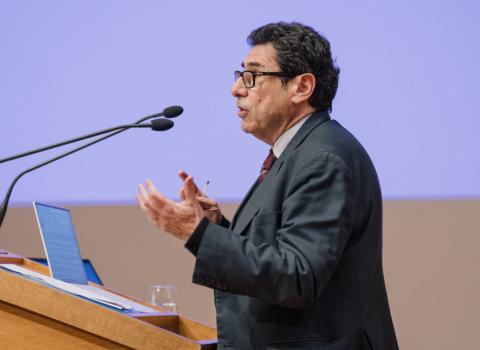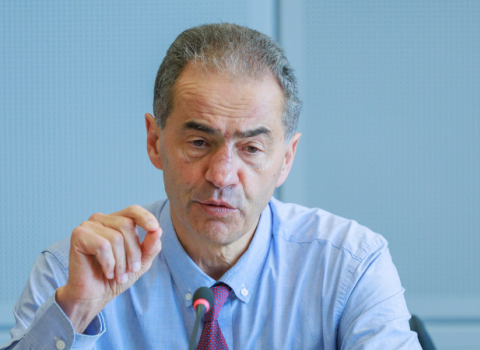Since its creation in 2007, the European Research Council (ERC) has earned the reputation of being a high-prestige funder of basic research in Europe.
But with the publication of an independent report in July, the spotlight suddenly turned on “excessively bureaucratic procedures” and “fundamental problems” that are undermining its governance, administration and operations. The ERC’s interim director, Jack Metthey, tells Science|Business how the ERC is responding to this criticism.

The ERC’s Jack Metthey: “My first priority is expert management."
One of the major criticisms of the report was the way the ERC treats the reviewers, referees and panellists whose time and expertise it depends on to ensure the research it funds is excellent. This “has been a source of serious misgivings amongst the research community”, and the system should be “drastically simplified” and made as user-friendly as possible, the report said.
Metthey’s career timeline
1977: Graduated from the Louis Pasteur University in Strasbourg with a Doctorate in Biological Sciences. Also holds a Master of Sciences from the University of California.
1980 to 1988: Software engineer and project manager in software companies.
1988: Joins the European Commission in the Directorate General Information Society.
1995: Moves to the EC’s Cabinet of the Commissioner in Charge of Research, Education and Youth, where his responsibilities included defining the 5th research Framework Programme.
1998: Moves to the Directorate General for Research where he was Director of Space and Transport.
Since October 2006: Director of the Implementation of the ‘Ideas’ Programme at the European Commission (July 2009: renamed Director of Relations with the ERC Executive Agency)
Since July 2008: Interim Director of the ERC Executive Agency
“People from say the United States had to make an advance, pay for trips, several thousand dollars, they would get reimbursed six months later and of course they would say ‘never again’,” Metthey explained. The paperwork had become “a genuine problem”, with only 20 percent of those asked to be remote referees accepting.
In a move that Metthey considers symbolic of bigger changes taking place at the agency, the ERC has since altered its reimbursement rules. Overseas experts are now repaid in seven days. The acceptance rate of those being asked to be remote referees has also doubled. “I know we are on the right track,” said Metthey, who having worked at the European Commission since 1988 has long experience of navigating its bureaucratic alleys and cul-de-sacs.
Merger of roles
Closer to home in the independent review was the panel’s recommendation that Metthey’s role as director be merged with that of secretary-general, currently held by Andreu Mas-Colell. With his pictures of New York, Las Vegas and the Beatles still waiting to be hung on the walls of his new office, a question mark hangs over how long Metthey will be staying at the ERC.
The review panel recommended that “a distinguished scientist with robust administrative experience” should be found for the new combined role, saying that merging the two functions would “provide a real chance to reunify what is artificially split by the decision/implementation-science/bureaucracy divides”.
“The general consensus is that this merger should happen,” Metthey said, adding that he too is in favour of simplifying governance in this way. The split between the scientific and administrative sides, which made sense when the ERC was first created, is in fact “more of a hindrance than anything else,” he said.
“There will be a rebalancing of power,” Metthey said. The new position will be filled by a distinguished scientist, but given this person will be responsible for 300 people and a budget of €7.5 billion, serious managerial experience is required also.
The ERC suggests in its formal response to the review that the logical time to make the appointment is as soon as the contracts of the current holders expire. But Metthey’s post as interim director doesn’t have a fixed term and Mas-Colell, who began as secretary-general on 1 July 2009, is due to stay in the position until December 2011.
A solution could be found sooner, though. “Our intention will be to do it really as soon as possible,” Metthey said. “There are already discussions going on.”
‘True professionalisation’
Many of the review’s ideas feed into the idea of a “true professionalisation” of the institution’s activities. Specific recommendations include introducing personnel policies that make it easier to recruit qualified scientists and setting up a standing identification committee to ensure a smooth procedure for the renewal or replacement of Scientific Council members. Metthey also wants the deliberations of the Scientific Council to be more transparent – for example, by making summaries of its debates public – and says the ERC’s website needs to be updated to make it more appealing.
On the actual funding of research projects, the report recommended the idea of a lump sum rather than a contract-based approach. Metthey said that lump sum funding, subject to the appropriate checks and controls, would “certainly simplify things for the grantees and for us”, as well as help the grant-holders spend more time in the lab and less on paperwork.
Lessons learnt
Lessons are also being learnt from the early calls for research proposals. Last month (September), the ERC announced the results of the second competition for starting grants. The success rate rose to 10 per cent, from 3 per cent in the first call, as the number of proposals fell to about 2,500, from more than 9,000 the first time. The call was profiled better so that only outstanding researchers applied, said Metthey. In his opinion, the optimum success rate would be around 15 to 20 per cent.
An alteration in the next call for starter grants will see a division into two groups, one for researchers with 2 to 6 years’ post-PhD experience, and another for those with 6 to 10 years’ experience. The hope is that this will attract more candidates in the very early stages of their research careers. Other challenges are drawing in more applicants from outside the EU, recruiting more female researchers and overcoming the “frustratingly disappointing results” in some parts of eastern and central Europe, he said. But excellence will remain the one and only selection criterion, he added.
The independent review, to which the European Commission will announce its formal response in mid-October, has given the ERC two years to implement the recommendations. At that point, it will be decided whether there is any need for a more fundamental reorganisation. This could mean reformatting the ERC under Article 171 of the Lisbon Treaty, which says the EU can create joint bodies with the structure necessary for the efficient execution of research, technological development and demonstration programmes. Such a move would give the ERC more freedom and distance from the Commission’s control.
Whether it comes to that remains to be seen. As Metthey summed up: for all the criticisms, the ERC has processed 15,000 applications, appointed 800 panel members, invited 2,000 remote referees and has 600 grantees working. “We have proved we’re capable of handling these processes,” Metthey said. “We need to improve, but we’re in the process of doing so.”





 A unique international forum for public research organisations and companies to connect their external engagement with strategic interests around their R&D system.
A unique international forum for public research organisations and companies to connect their external engagement with strategic interests around their R&D system.